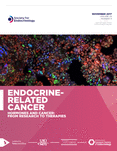Pro-survival and anti-apoptotic properties of androgen receptor signaling by oxidative stress promote treatment resistance in prostate cancer
- Department of Urology, Graduate School of Medical Sciences, Kyushu University, 3-1-1 Maidashi, Higashi-ku, Fukuoka 812-8582, Japan
- (Correspondence should be addressed to M Shiota; Email: shiota{at}uro.med.kyushu-u.ac.jp)
Abstract
Oxidative stress caused by an increase in reactive oxygen species levels or a decrease in cellular antioxidant capacity can evoke the modulation of various cellular events including androgen receptor (AR) signaling via direct or indirect interactions. In this review, we summarize the mechanisms of AR activation by oxidative stress including: i) AR overexpression; ii) AR activation by AR co-regulators or intracellular signal transduction pathways; iii) generation of AR mutations or splice variants; and iv) de novo androgen synthesis. AR signaling augmented by oxidative stress appears to contribute to pro-survival and anti-apoptotic effects in prostate cancer cells in response to androgen deprivation therapy. In addition, AR signaling suppresses anti-survival and pro-apoptotic effects in prostate cancer cells in response to various cytotoxic and tumor-suppressive interventions including taxanes and radiation through the modulation of βIII-tubulin and ataxia telangiectasia-mutated kinase expression respectively. Taken together, AR signaling appears to render prostate cancer cells refractory to various therapeutic interventions including castration, taxanes, and radiation, indicating that AR signaling is a comprehensive resistant factor and crucial target for prostate cancer treatment.
- Revision received 18 September 2012
- Accepted 1 October 2012
- Made available online as an Accepted Preprint 2 October 2012
- © 2012 Society for Endocrinology












